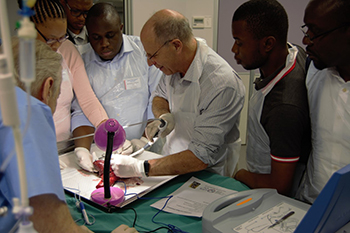Latest News Archive
Please select Category, Year, and then Month to display items
17 September 2018
Photo Charl Devenish
 Innocensia Mangoato’s research on using cannabis to reverse anticancer drug resistance has been awarded in the prestigious Women in Science Awards.
Innocensia Mangoato’s research on using cannabis to reverse anticancer drug resistance has been awarded in the prestigious Women in Science Awards.
“There’s this misconception among young people that science is difficult and that it’s somehow a man’s domain,” says Innocensia Mangoato, Masters student in Pharmacology, who has just been awarded in the prestigious Women in Science Awards by the Department of Science and Technology.
Cannabis research
Innocensia won in the Master’s Degree category for her research on the use of cannabis in reversing anticancer drug resistance. Her department had to apply for a special permit to grow cannabis for research and medicinal purposes.
“Her findings have already indicated a promising reversal of resistance to drugs in a variety of cancers. We plan to explore these results further in a possible PhD,” says her study leader, Prof Motlalepula Matsabisa.
Innocensia says she’s always had an interest in science, and initially wanted to study medicine. She ended up doing a BSc in Physiology and Genetics.
She hopes that her research will help government to develop a policy around the use of cannabis for medicinal purposes which could ultimately lead to developing cancer treatment with fewer side-effects.
Female mentors
“My mentor during my Honours studies was Dr Makhotso Lekhoa. Her passion for her field and her patience in conveying it to others really inspired me. We have some very powerful women in our Pharmacology Department,” says Innocensia.
Passion for science
“You know you’re passionate about your work when you find yourself going to the lab on Sunday afternoons!” she says. “I’m happy that I can be contributing to the knowledge production on this campus. And maybe one day I can be a mentor to other girls with that same passion for science.”
Great turnout for Hannes Meyer Symposium in Cardiothoracic Surgery
2017-05-05

Symposium attendees watch attentively as
Dr Johan Brink demonstrated a MAZE procedure
with a pig’s heart.
Photo: Supplied
The University of the Free State’s Faculty of Health Sciences hosted the annual Hannes Meyer Symposium in Cardiothoracic Surgery. The symposium was organised by Prof Francis Smit, head of the department of Cardiothoracic Surgery at the UFS, with the support from the Society of Cardiothoracic Surgeons of South Africa and the European Association of Cardiothoracic Surgery (EACTS). Over the past 16 years this symposium has steadily been growing in stature and prestige leading to the resounding success that was this year’s event.
Medical advancements explored
The aim of the symposium is to provide an overview of the latest advances in Cardiothoracic Surgery and perfusion as well as providing hands-on training via simulation to trainees from South Africa and the rest of the African continent. Didactic lectures and papers by registrars were an integral component of the symposium. The South African community was represented by various heads of departments, trainees, senior specialists and perfusionists from all the training centres in the country. There were also delegates representing Uganda, Mozambique, Nigeria and Zambia.
Heart surgery off to new heights
Simulation in Cardiothoracic Surgery and Perfusion can be compared to airline pilots with high risk, with complex surgeries being first done in simulators before being attempted in the real world. The UFS is proud to have a state-of-the-art simulation facility, which was used to facilitate the programme.
The range of simulation was extensive and included simple procedural models to complex full theatre setups with Human Performance Models in perfusion that simulated crisis scenarios with the aid of computerised devices that react in real time to human intervention.
Industry support highly appreciated
This event was coordinated by Dr Jehron Pillay, senior registrar in the Department of Cardiothoracic Surgery and Marilee Janse van Vuuren, deputy-director clinical technology, in the department. This was the first time that such extensive simulation models were used in the programme and judging from the positive response received, it has certainly set the benchmark for all future events.
The event has received invaluable support over the years from EACTS that has selected Bloemfontein as the site of its African training programme as a result of the high level of training and education achieved here.
The academic discussions were chaired by Profs Marko Turina and Jose Pomar (past presidents of EACTS) and Pieter Kappetein (past secretary general of EACTS) who are extremely well known internationally for their contribution to advancing Cardiothoracic training and education.
Our guests from EACTS presented didactical lectures on research methodology, international randomised trials and discussed recent developments and controversies in cardiothoracic surgery.
Registrars from all South African units presented a thoracic and cardiac surgery paper from each unit highlighting specific disease conditions, moderated by heads of departments and the international panel.
An event of this magnitude requires significant financial support and the medical industry in South Africa stepped up to the plate in providing financial and logistical support in order to make it possible.